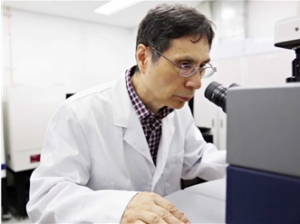[Built-in Universal Quantum Potential simulation to develop/create high-efficient new materials]
We have worked on development of innovative materials/devices along with their superfunctional characteristics. These include super-resolution of nanolens (Nature 2009a) associated with self-synthesis (Science 2001), super-magnetoresistance (Nat. Nano. 2008), ultrafast DNA sequencing (Nat. Nano. 2011), 2D molecular electronics spectroscopy (ACS Nano 2014), and superparamagnetism-assisted water remediation (ACS Nano 2010) using CVD-synthesized graphene (Nature 2009b). For the design of novel materials, we have developed built-in machine-learned universal first principles potentials/forces library using the sparse Gaussian process regression (Phys. Rev. B; J. Phys. Chem. Lett. 2021). This improves the scalability by rank reduction associated with local geometric features chosen by similarity measure through active learning. Several local feature environments in different phases can be merged to yield the big data of global, transferable, scalable and accurate universal potentials for complex systems. Thus, the machine-learned first principles molecular dynamic simulations, as a digital twin, are realized as a universal platform of virtual reality of materials for the novel design of high-performing single-atom electrocatalysts (Nat. Energy 2018), polymerization catalysts (Nat. Catal. 2018), batteries (Adv. Energy Mater. 2022), and perovskite solar cells (Nature 2021).
Ph.D., Chemistry, University of California, Berkeley (1982)
M.S., Physics, Korea Advanced Institute of Science and Techology (1975)
M.Eng., Applied Chemistry, Seoul National University (1973)
B.S., Applied Chemistry, Seoul National University (1971)
Research Professor, Chemistry, UNIST (2020~)
Distinguished Professor & Director, Chemistry, Center for Superfunctional Mater. UNIST (2014~2020)
Assist.-Full Professor, POSTECH Fellow, & Director, POSTECH (1988~2014)
Visiting Scholar/Scientist, Phys. MIT (1994-1995) / Elect. Engg. Columbia Univ. (2004-2005)
Visiting/Research Assist. Professor, Rutgers Univ. (1985-1987)
Postdoctoral Fellow, IBM/NY (1982-1985)
Kim, Kwang Soo
Research Professor
